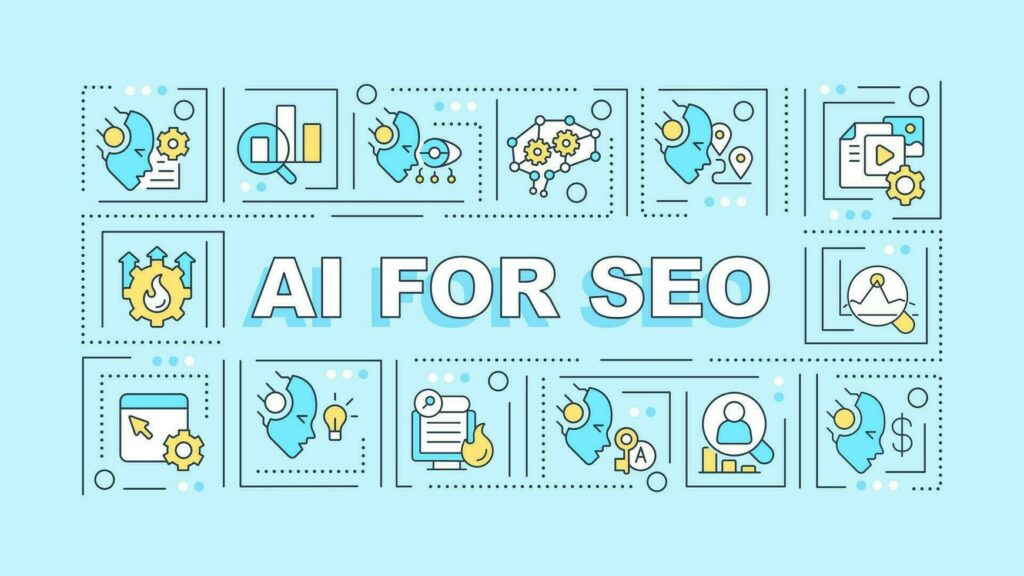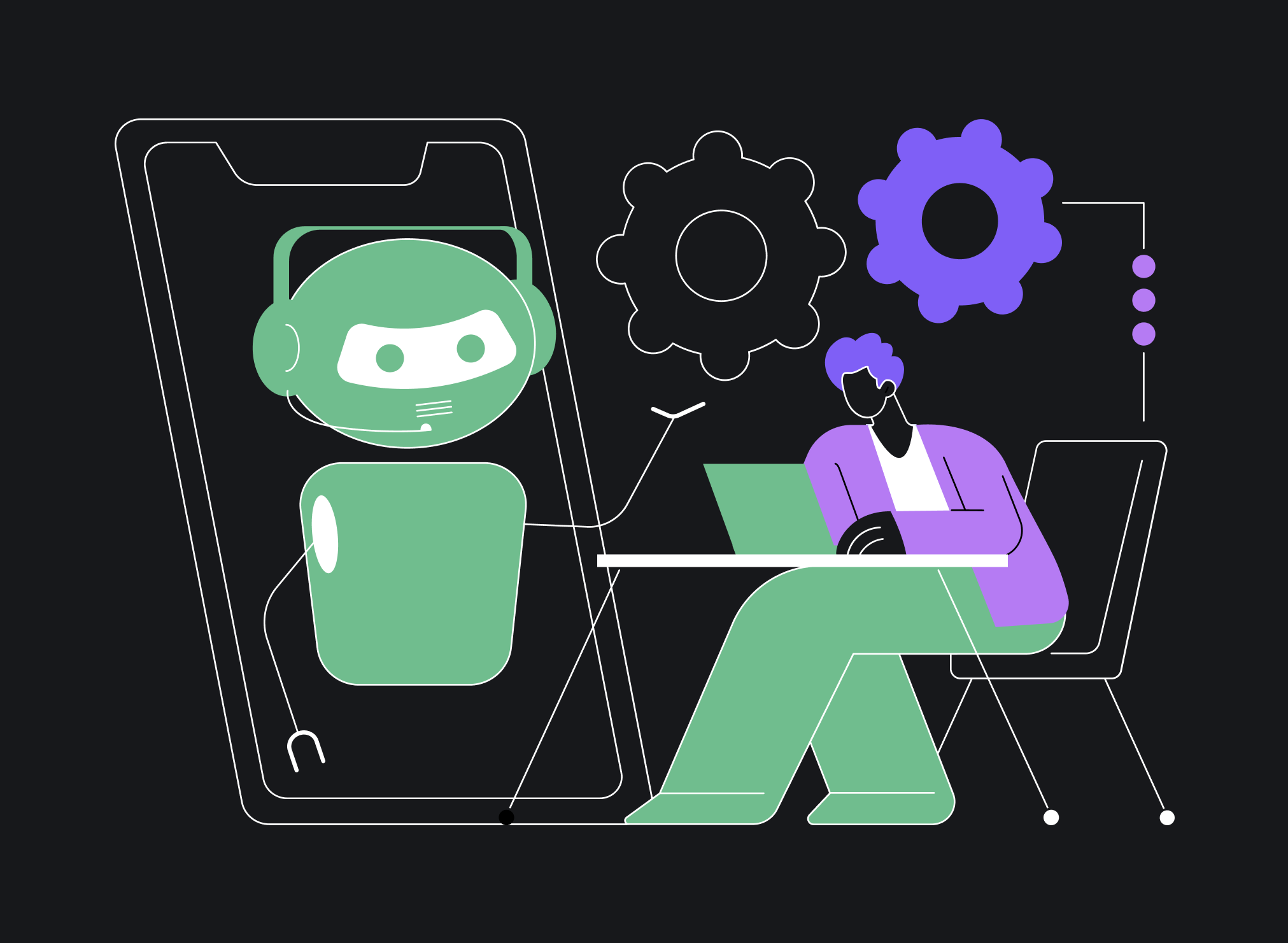SEO is more crucial than ever for businesses seeking visibility and engagement online. With the rapid advancements in technology, AI has emerged as a game-changer in the SEO industry. AI-powered tools and strategies are transforming how marketers approach keyword research, content creation, technical optimization, and user experience.
This article explores the multifaceted role of AI in enhancing SEO efforts, offering practical insights and best practices for integrating AI into your SEO strategy.
Table of Contents
Why Use AI in SEO
The benefits of using AI in SEO are substantial. Let’s look at some of them:
Improved Efficiency
One of the major benefits of using AI in SEO is the improvement in efficiency. You often have to perform repetitive tasks, such as keyword research, content optimization, and technical audits. These tasks can be time-consuming and tedious. AI automates these repetitive processes. It frees up time and resources to focus on more strategic activities.
For example, AI tools can automatically analyze large datasets to identify relevant keywords, generate optimized meta tags, and even perform site audits to detect technical issues. This automation reduces the need for manual intervention.
It allows you to handle more projects and deliver faster results. By streamlining these processes, AI significantly enhances productivity and enables SEO teams to achieve more in less time.
Enhanced Accuracy
AI excels in data analysis and can process vast amounts of information with high precision. When it comes to keyword targeting and SEO recommendations, this precision is invaluable.
Traditional methods of keyword research and optimization can be prone to human error, leading to less effective SEO strategies. AI tools, however, can analyze data points from various sources and provide highly accurate keyword suggestions that align with user intent.
AI’s ability to understand and process natural language means it can generate SEO recommendations that are more contextually relevant. This ensures that the content created is not only optimized for search engines but also resonates with the target audience. Enhanced accuracy in data analysis and keyword targeting results in better search engine rankings and more effective SEO campaigns.
Predictive Insights
AI offers the unique advantage of providing predictive insights, which are crucial for staying ahead of SEO trends and algorithm changes. Search engines frequently update their algorithms, and keeping up with these changes can be challenging. AI tools use machine learning algorithms to analyze past data and identify patterns that can predict future trends.
For instance, AI can forecast which keywords are likely to gain popularity based on current search trends and user behavior. It can also predict how changes in search engine algorithms might impact a website’s rankings. These predictive insights allow you to proactively adjust their strategies, ensuring that their websites remain competitive and well-positioned in search engine results.
Real-Time Data and Analytics
Another significant benefit of using AI in SEO is access to real-time data and analytics. Traditional SEO tools often provide data with a delay, making it harder to react quickly to changes in search engine rankings or user behavior. AI tools, however, can process and analyze data in real time, providing immediate insights.
Real-time analytics enable you to make faster and more informed decisions. For example, if there is a sudden drop in traffic, AI can quickly identify the cause, whether it’s a technical issue, a change in search engine algorithms, or a new competitor. This rapid analysis allows for timely interventions, minimizing potential negative impacts on website performance.
Real-time data also helps in continuously optimizing SEO strategies. By constantly monitoring and analyzing user behavior, search trends, and website performance, AI tools provide up-to-date recommendations.
This dynamic approach ensures that SEO strategies are always aligned with the latest trends and user expectations. This leads to sustained improvements in search engine rankings and user engagement.
What AI Can Do for SEO
AI-powered tools significantly enhance various aspects of SEO. Let’s take a look at what AI can do to enhance SEO.

Keyword Research
AI enhances keyword research by leveraging its ability to process and analyze vast amounts of data quickly and accurately. Traditional keyword research often involves manually sifting through keyword suggestions and search volumes. This is time-consuming and prone to human error.
AI-powered tools, on the other hand, can predict trends by analyzing search data patterns and user behavior. These tools use machine learning algorithms to identify which keywords are gaining popularity and which ones are losing traction. With this, marketers can stay ahead of trends.
It can analyze large datasets to uncover hidden opportunities that might be missed by conventional methods. It can identify related keywords, search queries, and semantic connections. These provide a more comprehensive understanding of what users are searching for.
This helps in identifying long-tail keywords. Long-tail keywords are crucial for capturing niche markets and driving targeted traffic to websites.
Content Creation and Optimization
AI tools are revolutionizing content creation and optimization by generating high-quality, relevant content tailored to user intent. These tools can analyze top-performing content in any niche and understand the context and themes.
They will then generate content that is both engaging and SEO-friendly. For instance, AI can suggest topics based on trending keywords. This would help writers create content that is more likely to attract traffic.
It can optimize existing content by analyzing factors such as readability, keyword density, and engagement metrics. Tools like ChatGPT can help ensure that the content is coherent, contextually relevant, and optimized for search engines.
AI can also recommend where to place keywords, how to structure articles for better readability, and which multimedia elements to include for enhanced engagement. This ensures that the content not only ranks well in search engines but also provides value to the readers.
On-Page AI in SEO
AI assists significantly in on-page SEO by optimizing various elements that are crucial for search engine rankings. Meta tags, headings, images, and internal linking structures all play a vital role in how search engines interpret and rank web pages. AI tools can automate the optimization of these elements by analyzing the content and suggesting improvements.
For example, it can generate optimized meta titles and descriptions that are keyword-rich and compelling to users. It can also ensure that headings (H1, H2, H3, etc.) are structured logically and contain relevant keywords. When it comes to images, AI can optimize alt text and file names, enhancing image search visibility and overall page relevance.
It can also analyze the internal linking structure of a website to ensure that it is logical and effective in distributing link equity. It can identify opportunities for internal links. These help search engines understand the relationship between different pages and improve the site’s overall SEO performance.
Off-Page AI in SEO
AI’s role in off-page SEO primarily involves enhancing link-building strategies, social media analysis, influencer identification, and reputation management.
Link building is a critical aspect of SEO. High-quality backlinks from reputable sites signal to search engines that a website is authoritative and trustworthy. AI tools can analyze the backlink profiles of competitors, identify potential link opportunities, and even reach out to website owners for link placements.
In terms of social media, AI can analyze engagement metrics to determine which content performs best and why. This insight allows marketers to tailor their social media strategies to drive traffic to their websites. AI can also identify key influencers in a particular niche who can help amplify content and build brand authority.
Reputation management is another area where AI excels. It can monitor mentions of a brand across the web, including social media platforms, forums, and review sites. It will analyze sentiment and detect potential issues early. This helps businesses address negative feedback promptly and maintain a positive online reputation.
Technical SEO
Technical SEO involves optimizing the infrastructure of a website to ensure that search engines can crawl and index it efficiently. AI helps with various technical aspects.
These include site speed optimization, mobile-friendliness, structured data, and crawlability. For instance, AI tools can analyze a website’s load times and suggest improvements to enhance speed, which is a crucial ranking factor.
Mobile-friendliness is another critical aspect of technical SEO. More users now access websites through mobile devices. AI can evaluate a site’s mobile performance and recommend changes to ensure a seamless user experience across all devices.
Structured data helps search engines understand the content of a page. It can also be optimized using AI. Tools can automatically generate and implement schema markup, improving the chances of earning rich snippets in search results.
Crawlability refers to how easily search engines can access and index a website’s content. AI tools can identify and fix issues that might hinder crawlability, such as broken links, duplicate content, and poor site architecture.
By addressing these technical SEO aspects, AI ensures that websites are easily accessible to search engines. This improves their chances of ranking well.
User Experience and Personalization
User experience is a critical component of AI in SEO, as search engines prioritize sites that offer a positive experience to users. AI enhances UX by providing personalized content recommendations and improving site navigation.
For example, AI in SEO can analyze user behavior and preferences to recommend relevant articles, products, or services. This keeps users engaged and reduces bounce rates.
AI also improves site navigation by analyzing how users interact with a website and identifying areas for improvement. This can include optimizing the layout, improving the search functionality, and ensuring that important content is easily accessible.
By enhancing UX, AI helps retain visitors. And it also sends positive signals to search engines, contributing to better SEO performance.
Tools and Platforms
AI-powered SEO tools and platforms have revolutionized how you manage and optimize their websites. Some of the most popular tools include SEMrush, Ahrefs, and Moz. Each of these platforms offers unique functionalities that help improve different aspects of AI in SEO.
SEMrush
SEMrush is one of the most widely used AI-powered SEO tools. It offers a comprehensive suite of features that cover all aspects of SEO. One of its key functionalities is keyword research.
It uses AI to analyze vast amounts of search data, providing users with accurate and relevant keyword suggestions. It can also identify keyword trends and predict which keywords will gain popularity, helping users stay ahead of the competition.
SEMrush also excels in content optimization. It offers a Content Analyzer tool that evaluates the SEO performance of your content and provides actionable recommendations. This includes suggestions for improving keyword usage, readability, and engagement.
The site audit tool uses AI to scan websites for technical issues, such as broken links, duplicate content, and site speed problems, and suggests fixes to enhance overall site performance.
Ahrefs
Ahrefs is another powerful AI-driven SEO platform known for its robust backlink analysis capabilities. Backlinks are crucial for SEO, as they signal to search engines that your site is authoritative and trustworthy.
It uses AI in SEO to analyze the backlink profiles of millions of websites, allowing users to see who is linking to their site, the quality of those links, and how their backlink profile compares to competitors.
Ahrefs also offers an advanced keyword research tool. Its AI-powered algorithms provide detailed keyword metrics, including search volume, keyword difficulty, and potential traffic.
This helps users choose the best keywords to target for their SEO campaigns. The content explorer tool uses AI to identify popular content in your niche.
Moz
Moz is a well-established SEO platform that uses AI in SEO to simplify and enhance various tasks. One of its standout features is the Moz Pro Keyword Explorer.
This tool provides comprehensive keyword analysis, including search volume, difficulty, and organic click-through rates. Moz’s AI algorithms also offer keyword suggestions and prioritize them based on their potential impact.
Moz also offers a powerful site audit tool called Moz Pro Site Crawl. This tool uses AI in SEO to identify technical issues, such as crawl errors, duplicate content, and missing meta tags.
It then provides recommendations to fix these issues, ensuring that your site is fully optimized for search engines. Moz’s Link Explorer tool analyzes your site’s backlink profile and provides insights into link building opportunities.
Other Tools
Beyond SEMrush, Ahrefs, and Moz, there are several other notable AI-powered SEO tools worth mentioning. For example, BrightEdge uses AI to provide real-time SEO recommendations and predictive insights, helping users stay ahead of search trends.
MarketMuse uses AI to analyze content and provide suggestions for improving topical authority and relevance. Surfer SEO combines AI and data-driven analysis to offer on-page optimization recommendations, ensuring that your content aligns with top-ranking pages.
Best Practices for Integrating AI into SEO Strategy
Integrating AI in SEO strategies can significantly enhance your efforts if done correctly. Here’s how:
1. Start with a Clear Goal
It’s crucial to start with a clear goal. Knowing exactly what you want to achieve will guide you in choosing the right tools and setting up your processes.
For example, you might aim to increase organic traffic, improve keyword rankings, boost content engagement, or enhance site performance. Each of these goals will require different approaches and tools.
A clear goal helps you stay focused and measure success more effectively. It allows you to SMART objectives. For instance, instead of a vague goal like; improve SEO, set a SMART goal such as increase organic traffic by 20% over the next six months.
2. Choose the Right Tools
The next step is to choose the right AI in SEO tools for your needs. Start by researching the features and capabilities of various tools to see which ones best fit your requirements.
For example, if your goal is to enhance keyword research, tools like SEMrush or Ahrefs might be ideal due to their advanced keyword analysis features. If you need help with content creation and optimization, tools like ChatGPT or Surfer SEO could be more suitable. For technical SEO improvements, consider tools like Moz or BrightEdge.
3. Monitor and Adapt
SEO is a dynamic field. Search engine algorithms and user behaviors are constantly evolving. Therefore, it’s essential to regularly monitor the performance of your AI in SEO tools and the impact they have.
Set up regular reviews to analyze KPIs. These would be organic traffic, keyword rankings, and conversion rates. AI tools often provide real-time data and analytics.
Doing so makes it easier to track these metrics and identify trends or issues quickly. Use these insights to make informed decisions and adapt your strategies as needed.
AI and SEO
Integrating AI into your SEO strategy offers substantial benefits, from improved efficiency and accuracy to predictive insights and real-time analytics. By starting with clear goals, selecting the right tools, and continuously monitoring and adapting your approach, you can leverage AI in SEO to enhance your efforts. Embrace AI-powered tools to stay ahead of trends, optimize your content, and achieve better search engine rankings.
Ready to elevate your SEO strategy with cutting-edge AI tools? Explore how EvolveDash can optimize your online presence!


















